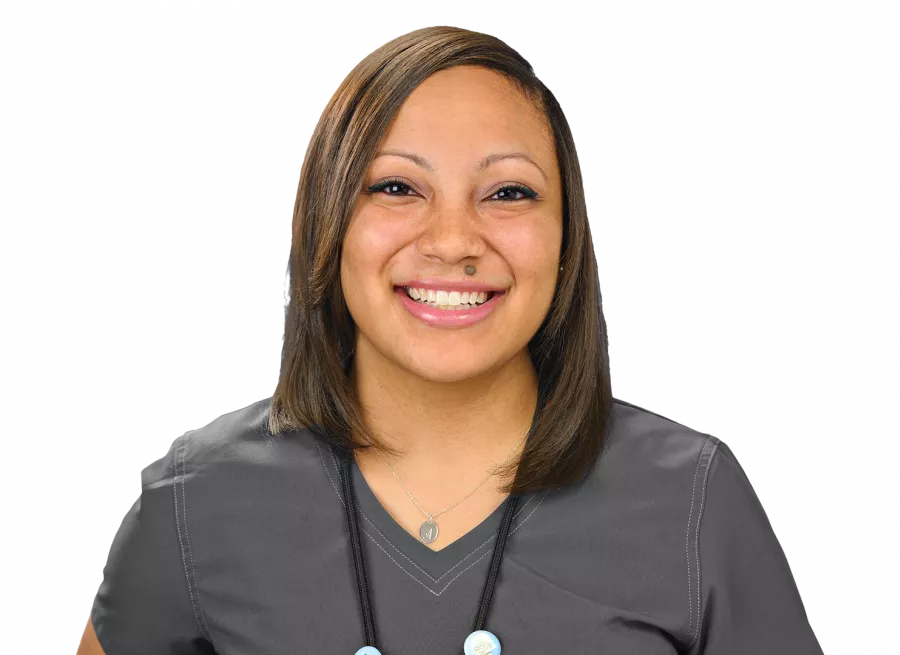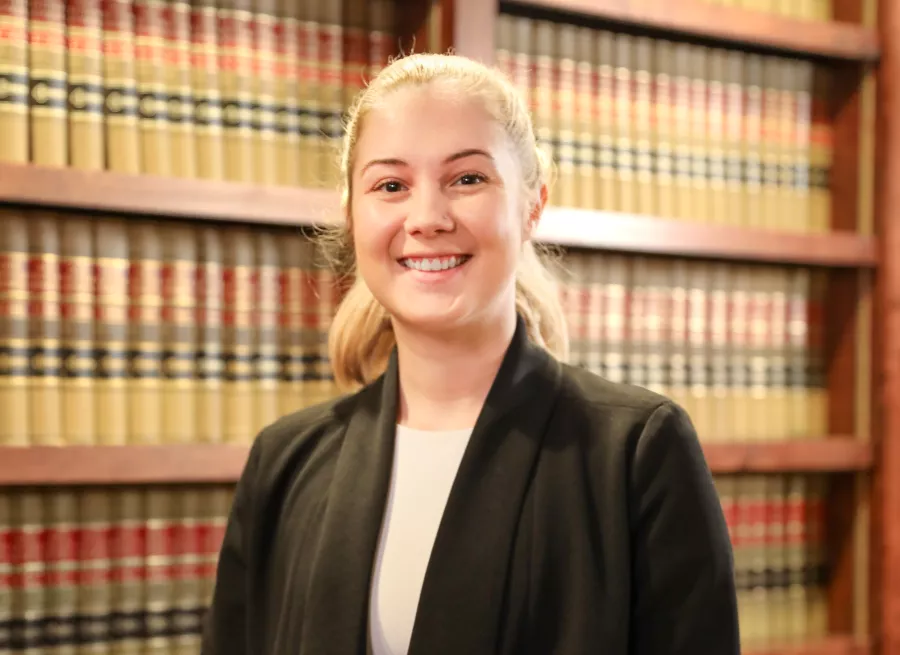Medical Laboratory Assistant
Academic Certificate
Overview
Within the Medical Laboratory Assisting program students will perform various clerical and preparatory tasks to aid in generating patient test results. Students will perform phlebotomy, specimen processing, urinalysis testing, slide staining, provider-performed microscopy, and point-of-care lab tests. Lastly, students will learn to operate computerized lab equipment and to use quality-control methods to guarantee accurate information for patient care.
Medical Laboratory Assistants (MLAs) are skilled individuals trained to perform laboratory tests and operate laboratory equipment. MLAs take tissue samples, blood, and other bodily fluids from patients, ensure that all specimens are labeled correctly, and prepare them for examination by a physician or lab tech. MLAs work in clinical settings under the supervision of lab techs and pathologists and are required to perform precise tests and procedures to guarantee accurate information for patient care. MLAs help analyze body fluids, isolate and identify microorganisms, prepare blood components, perform point-of-care tests, and help determine disease-related immune responses.
The MLA Certificate program prepares students to operate computerized lab equipment in a safe, cost-effective manner and to use quality control methods to assess the accuracy of lab data. Students acquire a working knowledge in the areas of phlebotomy, hematology, urinalysis, immunology, clinical chemistry, clinical microbiology, and accessioning. In addition, they develop important communication skills to be used in translating reports, records, and results.
View Medical Laboratory Assistant Student Handbook.
If you are interested in the Medical Laboratory Assistant program, please contact Mr. Stratton, Program Director, at strattonde@midlandstech.edu.
- Learning Settings
Learning experiences for students in the Medical Laboratory Assistant Program are provided in classrooms and laboratories on the Airport Campus in the Health Sciences Building. Laboratory experience is provided through modern equipment available in the two on-campus labs. Required clinical rotations are arranged by the program through affiliations with local healthcare facilities.
- Requirements and Certificates
Graduates of the program are eligible to take the Board of Certification (BOC) examination offered by the American Society for Clinical Pathology (ASCP) to earn the designation Medical Laboratory Assistant (MLA).
Expenses related to the MLA program include standard uniforms and safety gear, totaling around $300. Additionally, the fee for the American Society of Clinical Pathology Board of Certification examination is approximately $150.
Students must attain a grade of “C” in all curriculum courses to successfully complete the program. No course may be repeated more than one time. No more than 2 courses within the curriculum may be repeated and only one Medical Laboratory Assistant (MLT prefix) course may be repeated. If a student is not successful, they may not progress forward in the program as all MLT-prefix courses are taught on rotation.
Students must meet essential functions in order to apply to the MLA program.
No MLT-prefix courses may be transferred into the MLA program at Midlands Technical College.
Appropriate general education courses (non-MLT-prefix courses) may be transferred in from outside colleges or universities. To evaluate course equivalencies, please get in touch with Admissions, Advisement, or use the following website: https://www.sctrac.org/Student/Search-for-Course-Equivalencies
With necessary course substitutions, high school students can complete all general education courses through participating Dual Enrollment programs offered in local high schools.
Students can transfer in the following Midlands Technical College Corporate and Continuing Education (CCE) courses into the Medical Laboratory Assistant program:
- CEMPR-524 Medical Terminology
- CEMED-560 Phlebotomy Technician (this course only transfers into MLA and no other School of Health Care program)
- Accreditation
The MLA program is pending accreditation by the National Accrediting Agency for Clinical Laboratory Sciences.
National Accrediting Agency for Clinical Laboratory Sciences
5600 N. River Road, Suite 720
Rosemount, Illinois 60018-5119
773.714.8880
www.naacls.orgIn addition to the college’s placement test and the admission requirements for the School of Health Care, there are additional specific eligibility and interview criteria for the Medical Laboratory Assistant program. Note that the TEAS test is not a requirement for the MLA program.
View Program Outcomes Data.
- Admissions Criteria
- Observation in a clinical setting
- TOEFL test for international students
- Interview by the Medical Laboratory Admissions Committee
- Acceptable criminal background check and drug screening
- Physical Examination and various immunizations
- Other Criteria
• Acceptance into the college; including high school diploma or equivalent
- Program Mission Statement
It is the mission of the Medical Laboratory Assistant Program, while maintaining the philosophy of the College, that Medical Laboratory Assistants can be adequately and effectively trained to perform the majority of waived laboratory procedures from a certificate program to provide the community with medical lab assistants that are technically competent, of high moral character, and demonstrate professionalism and ethics so that patient care is in no way compromised.
- Program Goals and Graduate Competencies
The goals of the MLA Program are to provide each of its graduates with a sound background in the basics of medical laboratory sciences. The one-year curriculum prepares each graduate not only with technical skills but also with an ethical approach to laboratory work so that they may become an integral part of today’s modern healthcare team. Upon satisfactory completion of the program, including the earning of the MLA Certificate, the graduate of the MLA Program becomes eligible to sit for the Board of Certification MLA(ASCP) Examination.
- To provide an operational framework for the technical portions of the educational process which will prepare proficient Medical Laboratory Assistants.
- To provide coordination between the instruction given in the classroom (work, habits, skills, attitudes, and personal appearance) and actual practice in a medical laboratory.
- To provide a program whose graduates will be eligible to sit for licensing or certifying examinations that may be required by the majority of prospective employers in the Central Midlands Region.
- To accept a diversity of qualified students into the program in keeping with the college philosophy to serve the community.
- To offer a career ladder opportunity for current or aspiring phlebotomists.
- To offer an internal transfer agreement to transition from an MLA graduate to a MLT student while continuing one’s education further at Midlands Technical College.
- To seek the advice of professionals in the field of clinical laboratory medicine, so as to strengthen the curriculum and facilitate the coordination of the college program with the local medical institutions.
- To continue to keep the curriculum current and to keep abreast of the changing needs of the medical laboratory profession.
- Additional Information
Students must apply to the college before applying to the MLA program. Applications to the MLA program are not publicly available. Applications must be released by a School of Health Care advisor. Before the programmatic application is released, students must complete an advisement appointment.
The MLA application period is January 1st June 1st each year. Students are only accepted into the program each Fall (August) as the MLT-prefix courses are taught on rotation. Applicants will be offered an interview with the program’s admissions committee over the summer. Once the student has completed the interview and required paperwork, the student is then conditionally accepted in the MLA program. Before starting the MLA program, students must attend the mandatory New Student Orientation that is typical held the Thursday before the start of the fall semester.
If accepted into the MLA program, students are required to have a background check, drug test, and various immunizations. These requirements are set by the clinical sites and department safety officer. Neither the MLT program or the college has authority to waive these requirements as they are in place for the safety of the employees and patients at the clinical sites. Students must cover the costs associated with these requirements and complete them by the specified due date in order to continue in the MLA program. Additionally, students are expected to purchase disposable gloves, a calculator, colored pencils, uniforms, and name tags. Uniforms include solid black scrubs and a fluid-resistant lab coat.
After completing the MLA program, we encourage students to obtain an associate of applied science degree in Medical Laboratory Technology from Midlands Technical College. Students who choose this path will transfer in 7 courses (20 credit hours) from the MLA program to the MLT program and will be eligible to start the MLT program the semester following MLA graduation. With said associate degree, students are eligible to sit for the Medical Laboratory Technician (MLT) certification exam through ASCP. While working as a Medical Laboratory Assistant, most healthcare agencies will pay for the Medical Laboratory Technology associate degree through tuition reimbursement. In addition to base pay, lab professionals have the ability to earn a higher salary through shift differential, weekend differential, holiday pay, overtime, PTO cash outs, traveling positions, and/or a secondary PRN position.
Although times may vary depending on the semester, students are expected to be available for in-person classes Monday through Thursday from 9:00 AM until 4:30 PM. All MLT classes are exclusively taught in the Health Science building of the Airport campus. Clinical rotation times are at the discretion of the facility, and typical start at 7:00 AM.
Are you new to the college? Take a virtual tour of our campuses.
Sample Program Plan and Costs
Class Delivery Methods
View current courses offered via our online course directory.
| On-Campus | Traditional. Classes meet on campus. |
|---|---|
| Virtual | 100% online. Meets with a live instructor and classmates on specific days, at specific times. Uses web conferencing software, like Zoom. |
| Hybrid | Some classes on campus. Some classes online or virtual. |
| Online | 100% online. Due dates for projects and assignments. Self-paced work on your time. |
Full Time Schedule
| Semester | Course ID | Course Title | Classroom | Online | Hybrid | Virtual | Credits |
|---|---|---|---|---|---|---|---|
| Semester 1 (14 Credit Hours) |
MLT-102 |
Medical Lab Fundamentals Medical Lab Fundamentals ID: MLT-102 Credit Hours: 3 This course introduces basic concepts and procedures in medical laboratory technology. |
• | 3 | |||
| AHS-102 |
Medical Terminology Medical Terminology ID: AHS-102 Credit Hours: 3 This course covers medical terms, including roots, prefixes, and suffixes, with emphasis on spelling, definition, and pronunciation. |
• | • | 3 | |||
| COL-106 |
Skills for College Success Skills for College Success ID: COL-106 Credit Hours: 1 This course is designed to enhance the skills of entering freshmen to facilitate their ability to succeed in the college environment. The course topics include student/instructor expectations, time management, library/computer orientation, listening/note-taking, studying for success, learning styles/personality types, and diversity and differences on campus. |
• | 1 | ||||
| BIO-210 |
Anatomy and Physiology I Anatomy and Physiology I ID: BIO-210 Credit Hours: 4 This is the first in a sequence of courses, including an intensive coverage of the body as an integrated whole. All body systems are studied. Emphasis is placed on the manner in which systems interact to maintain homeostasis. The study includes general chemistry principles, biochemistry, cells and tissues and the following systems will be covered: integumentary, skeletal, muscular, nervous and special senses. |
• | • | • | 4 | ||
| MAT-102 |
Intermediate Algebra Intermediate Algebra ID: MAT-102 Credit Hours: 3 This course includes the study of linear systems and applications; quadratic expressions, equations, functions, and graphs; and rational and radical expressions and functions. |
• | • | 3 | |||
| Semester 2 (12 Credit Hours) |
MLT-125 |
Introduction to Clinical Chemistry Introduction to Clinical Chemistry ID: MLT-125 Credit Hours: 4 This course provides an introduction to basic concepts in clinical chemistry. |
• | 4 | |||
| ENG-160 |
Technical Communications Technical Communications ID: ENG-160 Credit Hours: 3 This course is a study of various technical communications such as definitions, processes, instructions, descriptions, and technical reports. |
• | • | • | 3 | ||
| MLT-104 |
Basic Medical Microbiology Basic Medical Microbiology ID: MLT-104 Credit Hours: 2 This course introduces the study of basic concepts of medical microbiology. |
• | 2 | ||||
| AHS-141 |
Phlebotomy for Health Career Provider Phlebotomy for Health Career Provider ID: AHS-141 Credit Hours: 3 This course contains the essential theory, skills, and special procedures required to meet the venipuncture needs in hospitals, clinics, and other health care settings. |
• | 3 | ||||
| Semester 3 (5 Credit Hours) |
MLT-251 |
Clinical Experience I Clinical Experience I ID: MLT-251 Credit Hours: 5 This course provides an integrated, clinically-based rotation which correlates cognitive and technical skills in selected areas of the clinical laboratory. |
5 | ||||
| Total Credit Hours | 31 | ||||||
| Estimated Cost Financial Aid |
$6,324.00 Not including fees and equipment |
||||||
Part Time Schedule
| Semester | Course ID | Course Title | Classroom | Online | Hybrid | Virtual | Credits |
|---|---|---|---|---|---|---|---|
| Semester 1 (5 Credit Hours) |
COL-106 |
Skills for College Success Skills for College Success ID: COL-106 Credit Hours: 1 This course is designed to enhance the skills of entering freshmen to facilitate their ability to succeed in the college environment. The course topics include student/instructor expectations, time management, library/computer orientation, listening/note-taking, studying for success, learning styles/personality types, and diversity and differences on campus. |
• | 1 | |||
| BIO-210 |
Anatomy and Physiology I Anatomy and Physiology I ID: BIO-210 Credit Hours: 4 This is the first in a sequence of courses, including an intensive coverage of the body as an integrated whole. All body systems are studied. Emphasis is placed on the manner in which systems interact to maintain homeostasis. The study includes general chemistry principles, biochemistry, cells and tissues and the following systems will be covered: integumentary, skeletal, muscular, nervous and special senses. |
• | • | • | 4 | ||
| Semester 2 (6 Credit Hours) |
ENG-160 |
Technical Communications Technical Communications ID: ENG-160 Credit Hours: 3 This course is a study of various technical communications such as definitions, processes, instructions, descriptions, and technical reports. |
• | • | • | 3 | |
| AHS-102 |
Medical Terminology Medical Terminology ID: AHS-102 Credit Hours: 3 This course covers medical terms, including roots, prefixes, and suffixes, with emphasis on spelling, definition, and pronunciation. |
• | • | 3 | |||
| Semester 3 (3 Credit Hours) |
AHS-141 |
Phlebotomy for Health Career Provider Phlebotomy for Health Career Provider ID: AHS-141 Credit Hours: 3 This course contains the essential theory, skills, and special procedures required to meet the venipuncture needs in hospitals, clinics, and other health care settings. |
• | 3 | |||
| Semester 4 (6 Credit Hours) |
MLT-102 |
Medical Lab Fundamentals Medical Lab Fundamentals ID: MLT-102 Credit Hours: 3 This course introduces basic concepts and procedures in medical laboratory technology. |
• | 3 | |||
| MAT-102 |
Intermediate Algebra Intermediate Algebra ID: MAT-102 Credit Hours: 3 This course includes the study of linear systems and applications; quadratic expressions, equations, functions, and graphs; and rational and radical expressions and functions. |
• | • | 3 | |||
| Semester 5 (6 Credit Hours) |
MLT-125 |
Introduction to Clinical Chemistry Introduction to Clinical Chemistry ID: MLT-125 Credit Hours: 4 This course provides an introduction to basic concepts in clinical chemistry. |
• | 4 | |||
| MLT-104 |
Basic Medical Microbiology Basic Medical Microbiology ID: MLT-104 Credit Hours: 2 This course introduces the study of basic concepts of medical microbiology. |
• | 2 | ||||
| Semester 6 (5 Credit Hours) |
MLT-251 |
Clinical Experience I Clinical Experience I ID: MLT-251 Credit Hours: 5 This course provides an integrated, clinically-based rotation which correlates cognitive and technical skills in selected areas of the clinical laboratory. |
5 | ||||
| Total Credit Hours | 31 | ||||||
| Estimated Cost Financial Aid |
$6,324.00 Not including fees and equipment |
||||||
What’s next after I complete this program?
Begin a career immediately upon graduation
Medical Laboratory Assistants work behind the scenes in health care providing physicians with the vital information they need to diagnose, treat, and monitor patient health. Without the lab team, physicians are just guessing. Many opportunities are available for entry-level positions in local clinical labs under the titles of Medical Laboratory Assistant, Clinical Laboratory Assistant, Phlebotomist, Histology Assistant, Cytology Assistant, Lab Courier, Lab Accessioner, and Specimen Accessioner.
Medical Laboratory Technology degree from Midlands Technical College
Medical Laboratory Assistants have the opportunity to advance in the field by getting an associate degree in Medical Laboratory Technology. After completing the MLT program at Midlands Technical College, graduates can sit for the MLT board of certification exam through ASCP and become a certified lab technician. Most employers offer tuition assistance/reimbursement to obtain this associate's degree. Students who choose this path will transfer seven courses (20 credit hours) from the MLA program to the MLT program and will be eligible to start the MLT program the semester following MLA graduation. MLTs are encouraged to continue their education further by obtaining a bachelor's, master’s, or even doctoral degree in laboratory medicine, microbiology, pathology, or many other disciplines.



